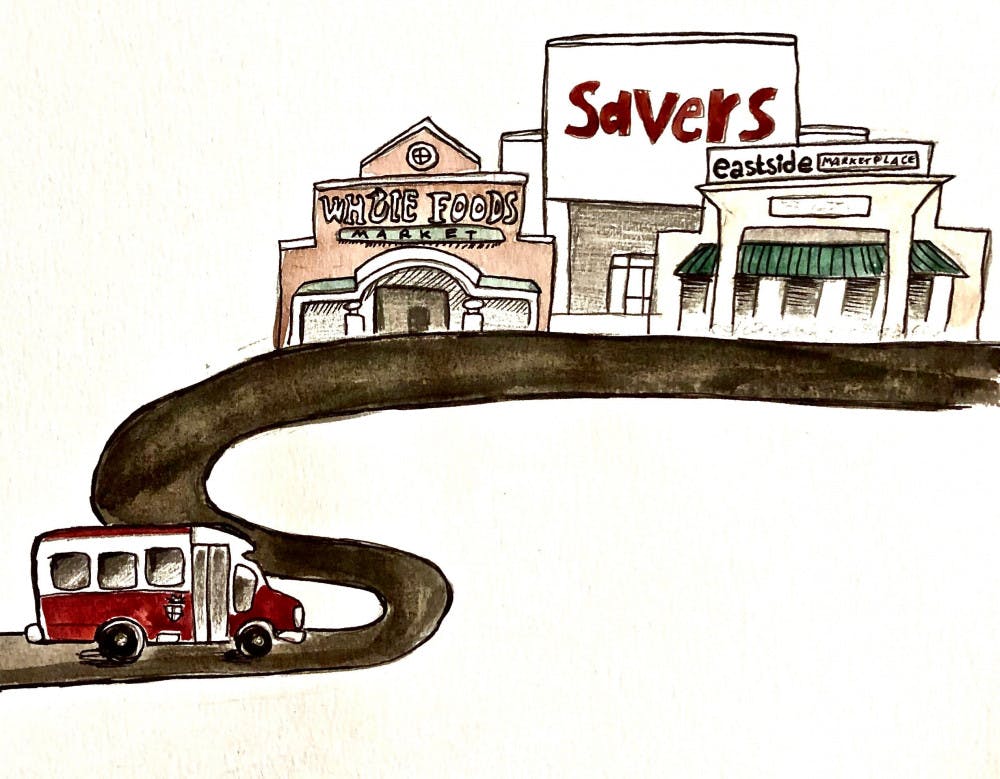The University launched two initiatives to bolster food security on campus, according to an Oct. 8 email to undergraduates from the Undergraduate Council of Students.
First, the Brown OnCall shuttle will now drop off and pick up students at the East Side Marketplace, Savers, Stop & Shop and Walmart locations closest to campus. The second initiative allows students to receive $5 off grocery orders over $60 through grocery delivery service Peapod, as well as free delivery for 90 days with the code “AMSBrown.”
“Walmart and Stop & Shop and Savers are all kind of clustered in a fairly close area,” said Elizabeth Gentry, assistant vice president of business and financial services. Though Savers does not sell groceries, it was within the route’s expanded area.
The University’s Ad Hoc Working Group on Food Security evaluated food insecurity among University students in the spring 2019 semester and produced a series of recommendations to the University, which included the shuttle and Peapod initiatives. The working group, which is no longer active, defined food security as “equitable access to healthy, safe, nutritious foods, so that students can thrive and take full advantage of their educational experience,” said Marisa Quinn, chief of staff to the Provost. Their work was informed by a March 2019 survey, in which about 30 percent of undergraduate respondents said they were experiencing some form of food insecurity, according to Quinn.
A meal plan requirement for sophomores, which drew backlash from members of the student body, is also among the University’s recent efforts to address food insecurity as a result of the Working Group’s recommendations, The Herald previously reported. Other changes implemented after the Working Group’s feedback include commitment to providing meals over spring break at no extra cost to all students on meal plans and a newly developed meal gap program that increases accessibility to dining halls for undergraduate, graduate and Med School students.
The OnCall shuttle expansion grew out of the survey’s report that 70 percent of undergraduates who reported experiencing food insecurity consider time a significant factor in accessing food, Quinn said. The Transportation Office coordinates the expanded shuttle route and will evaluate the success of the program by tracking the number of visits to the newly added facilities. “I think we’ve done a great thing in terms of providing other opportunities for our students, and we’ll see if they actually take advantage of it,” Gentry said.
If they do, the program will transition from a pilot program to a more permanent service, Gentry added.
The Peapod discount was made possible by collaboration with The Warren Alpert Medical School, which had previously been in discussions with Peapod, Quinn said. “We checked and said, ‘can we expand this to the whole Brown community?,’ and they were more than open to that,” Quinn said.
With these two initiatives, Quinn said she hopes students “will have more time that they can devote to their curricular and co-curricular activities, because they’re spending less time thinking about how to get food or how to get to a grocery store to get food.”
“Having access to more affordable grocery stores can really change the game,”said Kobi Weinberg ’20. “It’s really something the University should be facilitating a little bit more, and I think the shuttle program is a great way of doing that.”
“Personally speaking, trying to access stores like Savers, East Side (Marketplace and) Walmart has been difficult in the past,” said UCS President William Zhou ’20. “It’s either a very far walk or … a ride on the RIPTA, which can be very slow, so I think having now the expanded OnCall shuttle program makes it a lot easier to reach these destinations.”
UCS will also continue working to further reduce food insecurity, Zhou said. For instance, in a partnership with Brown Dining Services, the Council hopes to run workshops to help students who are off meal plan understand ways that they can prepare meals. The Council is also advocating for a potential grocery store on campus.
Correction: A previous version of this article stated that 70 percent of undergraduates consider time a significant factor in accessing food. In fact, 70 percent of undergraduates who reported experiencing food insecurity consider time a significant factor in accessing food. The Herald regrets the error.





